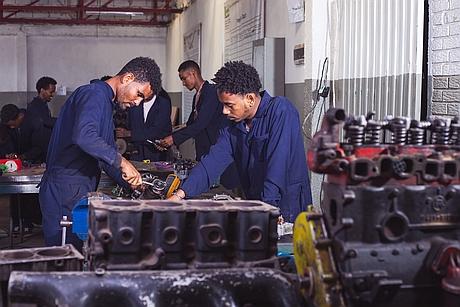“A little hope that there are also some opportunities here”- Economic self-reliance for migrants and returnees

“When I came back from migration, I had nothing in my pocket. I wanted to immediately return back even though I had a tough time during the migration journey. I wanted to return to Moyale to resume my migration journey. But I gave myself a little chance to work […] A local NGO gave me one pool table [..] within a short time I was able to earn [..] That gave me a little hope that there are also some opportunities here.”
This Ethiopian returnee was deported from a detention camp in Tanzania and took a chance on the economic opportunities available in-country. Though his story is a successful one, the majority of returnees, migrants, and victims of trafficking struggle to integrate economically and maintain livelihoods in Ethiopia.
A new report to highlight sustainable opportunities
Creating sustainable opportunities for returnees, migrants and victims of trafficking and addressing the root causes of migration is a long-standing issue in the Horn of Africa. To contribute to this area, the Better Migration Management programme, funded by the European Union and Germany, launched its new report ‘In Search of Sustainable Opportunities: Mapping of economic initiatives for migrants, returnees and victims of trafficking in Ethiopia’ on 6 September. The report was launched in collaboration with the Ministry of Labor and Skills and the National Partnership Coalition.
The report compiles data on economic opportunities in-country to support migrants, returnees and victims of trafficking, highlights challenges and shares success stories. The overall findings of the report were presented to government representatives from the regions of Amhara, Oromia and Southern Nations, Nationalities and People’s Region, as well as civil society and international organizations, including Comunita Volontary per il Mondo (CVM), Timret-Le Hiwot Ethiopia, the Association for Forced Migrants, the International Labour Organization, the British Council among others.
In welcoming the report, Mr Amsalu Bashe, representative of the Ministry of Labor and Skills noted: “This study is important since knowing who does what creates the opportunity to work in coordination and provide services in a consistent and accessible manner. This insight on the challenges, gaps, and good practices in creating sustainable opportunities will help all stakeholders to take up the assignment to solve the problems in future programme implementation.”
Overcoming the challenges
The report highlights project implementers' challenges when designing and creating sustainable opportunities. These include shortage of funding to cover all the costs of sustainable reintegration programmes, short time frames for implementation, corruption, cumbersome bureaucracy, and lengthy processes in regional, zonal and woreda (district) level government offices, amongst others. Migrants, returnees, and victims of trafficking partaking in these economic initiatives also referred to obstacles that they faced such as insufficient capital to start a business, expensive rent, insufficient support to purchase quality materials, unavailability of jobs and low wages. One returnee explained ‘The grant I received was insufficient to start a poultry business based on my poultry training. Since the fodder for the chickens is expensive, the business doesn’t have income other than sustaining the chickens. I am also unable to pay my rent.” Others lament the low salaries offered after training “My friend and I received housekeeping and food preparation training, however the salary we were offered was very low and also came with long working hours.”
The road to improving the economic prospects of migrants, returnees and victims of trafficking is a long one, but the report illustrates good practices such as strong partnerships with the private sector, phased programming that takes into account the medical and psycho-social needs of individuals and a tailored approach to ensure the skills, interests, experiences and aspirations are at the forefront of economic re-integration programming.
Comprehensive sustainable solutions and reintegration
Since 2017, the Better Migration Management programme has been working with civil society organisations to assist migrants, returnees, and victims of trafficking. Firstly, the services cover basic needs such as accommodation, food, and medical and psychological counselling. But economic reintegration support also plays a crucial role. To ensure long-term self-reliance fully and successfully, all actors must play their part, including the private sector.
The report is a joint product of governmental and non-governmental actors who contributed significantly. It aims to inform future programming for all stakeholders working in the migration sphere as well as identify good practices that can generate solutions and offer real opportunities to returning Ethiopians.
About the programme
The Better Migration Management (BMM) programme is financed by the European Union through the EU Emergency Trust Fund for Africa and the German Federal Ministry for Economic Cooperation and Development (BMZ) and implemented by the Deutsche Gesellschaft für Internationale Zusammenarbeit (GIZ) GmbH jointly with the British Council, CIVIPOL, IOM and UNODC.
The programme supports Ethiopian authorities to facilitate safe, orderly, and regular migration and is therefore working to improve migration governance, address trafficking in human beings and the smuggling of migrants and provide protection to vulnerable migrants and victims of trafficking.
Authors: Mohbuba Choudhury and Julia Kost